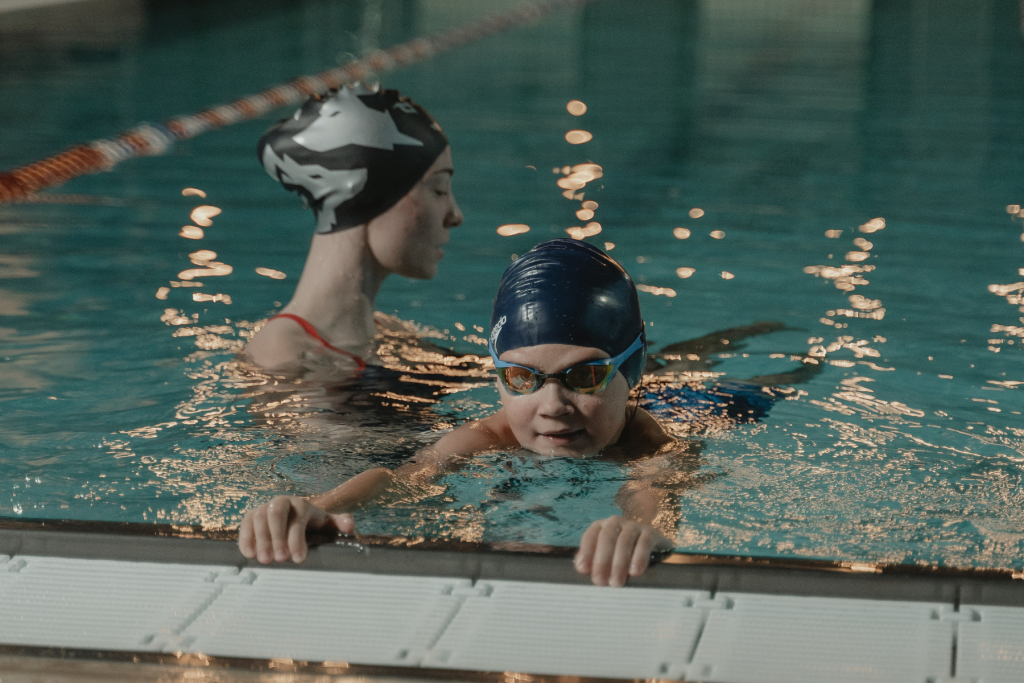Discover the benefits of aquatic therapy for postpartum care and find out if there are specialized therapists trained to provide this unique form of rehabilitation.
Are There Aquatic Therapy Specialists Trained for Postpartum Care?

If you’re a new mom navigating the challenges of postpartum recovery, you may be eager to explore different avenues of therapy and care. One option that has gained popularity in recent years is aquatic therapy. But what exactly is aquatic therapy, and are there specialists trained to specifically cater to postpartum needs? Let’s dive into the world of aquatic therapy and find out!
Understanding Aquatic Therapy
Before we delve into the specifics of postpartum care, let’s first understand what aquatic therapy is all about. At its core, aquatic therapy involves performing exercises and activities in water, under the guidance of a trained professional, to improve overall well-being and promote physical rehabilitation. It offers a unique environment that combines the benefits of buoyancy, hydrostatic pressure, and resistance to facilitate healing and recovery.
Aquatic therapy is not just about splashing around in a pool; it is a carefully designed treatment modality that can benefit individuals of all ages and physical conditions. The therapeutic properties of water have been recognized for centuries, and aquatic therapy harnesses these properties to provide a safe and effective method of rehabilitation.
When you step into the refreshing waters of a therapy pool, you’ll notice how the buoyancy helps to support your body, reducing the impact on your joints and muscles. This is especially beneficial during the postpartum period when your body may still be healing from the physical demands of pregnancy and childbirth. The buoyancy of the water allows you to move with greater ease and comfort, enabling you to perform exercises that may be challenging on land.
Additionally, the hydrostatic pressure of the water can improve blood circulation and reduce swelling, providing relief to those achy muscles and joints. The pressure exerted by the water helps to increase venous return, which aids in the removal of waste products and promotes the delivery of oxygen and nutrients to the tissues. This enhanced circulation can accelerate the healing process and alleviate pain.
But the benefits of aquatic therapy don’t end there! Working out in water also offers resistance, which challenges your muscles and enhances strength and endurance. The viscosity of water creates a natural resistance that requires your muscles to work harder, leading to increased muscle tone and improved overall fitness. Whether you’re aiming to regain your pre-pregnancy strength or simply looking to improve your physical well-being, aquatic therapy can be a valuable tool.
Plus, the environment itself is soothing and can uplift your mood, providing a welcome escape from the stresses of early motherhood. The sound of water gently lapping against the pool walls, the sensation of weightlessness as you float, and the warm embrace of the water can create a sense of tranquility and relaxation. This serene atmosphere can help to reduce stress and anxiety, allowing you to focus on your recovery and enjoy the therapeutic benefits of aquatic therapy.
Benefits of Aquatic Therapy
Aquatic therapy has a wide range of benefits, making it a sought-after option for postpartum care. One of the most significant advantages is its ability to improve physical function. Whether you’re struggling with joint pain, muscle weakness, or overall mobility issues, aquatic therapy can help you regain strength and flexibility in a gentle yet effective way.
By engaging in targeted exercises and activities in water, you can gradually increase your range of motion, improve balance and coordination, and enhance your overall physical performance. The low-impact nature of aquatic therapy makes it an ideal choice for individuals recovering from childbirth, as it minimizes stress on the joints and muscles while still providing a challenging workout.
Another notable benefit of aquatic therapy is the positive impact it has on mental well-being. As a new mom, it’s no secret that the postpartum period can bring a rollercoaster of emotions. Engaging in therapy sessions in a serene aquatic environment can provide a sense of calm and relaxation, reducing stress and anxiety levels. It’s like a mini vacation for your mind!
The combination of physical activity, sensory stimulation, and the therapeutic properties of water can help to release endorphins, the body’s natural feel-good chemicals. These endorphins can boost your mood, promote a sense of well-being, and even alleviate symptoms of postpartum depression. Aquatic therapy offers a holistic approach to postpartum care, addressing both the physical and emotional aspects of recovery.
In conclusion, aquatic therapy is a valuable tool for postpartum care. Its unique properties, including buoyancy, hydrostatic pressure, and resistance, provide a safe and effective environment for healing and rehabilitation. Whether you’re looking to regain strength and flexibility, alleviate joint pain, or simply find a moment of relaxation amidst the demands of new motherhood, aquatic therapy can offer a multitude of benefits. So, take the plunge and discover the transformative power of water!
The Role of Aquatic Therapy in Postpartum Care
Now that we’ve explored the wonders of aquatic therapy, let’s focus on how it can specifically support postpartum recovery. The postpartum period brings a multitude of physical changes and emotional challenges, and aquatic therapy is uniquely positioned to address them.
Physical Changes After Pregnancy
Pregnancy and childbirth take a toll on your body, as any mom can attest. From weakened abdominal muscles to pelvic floor dysfunction, there’s a lot to navigate during the postpartum period. Thankfully, aquatic therapy can provide a safe and effective way to rebuild your core strength and alleviate discomfort caused by these physical changes. Gentle exercises and movements in water can target those specific areas, aiding in rehabilitation and enhancing overall functionality.
During pregnancy, the abdominal muscles stretch and weaken to accommodate the growing baby. This can lead to diastasis recti, a condition where the abdominal muscles separate. Aquatic therapy can help in the healing process by providing a low-impact environment that reduces pressure on the abdominal muscles while still allowing for targeted exercises. The buoyancy of the water supports the body, making it easier to engage the core muscles without straining the weakened area.
In addition to diastasis recti, many women experience pelvic floor dysfunction after giving birth. This can manifest as urinary incontinence, pelvic pain, or discomfort during intercourse. Aquatic therapy can be particularly beneficial for strengthening the pelvic floor muscles. The water’s resistance provides a gentle yet effective workout for these muscles, helping to improve bladder control and alleviate pain or discomfort.
Emotional Well-being and Aquatic Therapy
Postpartum care goes beyond the physical realm and encompasses emotional well-being as well. Many new moms struggle with mood swings, postpartum depression, and anxiety as they adapt to the demands of motherhood. This is where aquatic therapy works its magic once again. The combination of the soothing aquatic environment, guided exercises, and the support of a trained specialist can create a therapeutic experience that uplifts your spirit, boosts your mood, and helps you navigate the emotional challenges of the postpartum period with more ease.
Water has a calming effect on the mind and body. The sensation of being immersed in water can help reduce stress and anxiety, promoting relaxation and a sense of well-being. Aquatic therapy sessions often incorporate mindfulness techniques, such as deep breathing and visualization, to further enhance the emotional benefits. These practices can help new moms find moments of tranquility amidst the chaos of motherhood, allowing them to recharge and better cope with the emotional rollercoaster that often accompanies the postpartum period.
Furthermore, aquatic therapy provides a supportive and nurturing environment. The presence of a trained specialist who understands the unique challenges of postpartum recovery can make a significant difference in a new mom’s journey. The specialist can provide guidance, encouragement, and emotional support, creating a safe space for moms to express their concerns and fears. This therapeutic relationship can be instrumental in helping new moms develop a positive mindset and build resilience as they navigate the ups and downs of motherhood.
Training of Aquatic Therapy Specialists
You might be wondering, though, if there are professionals who specialize in aquatic therapy for postpartum care. Rest assured, there are indeed trained specialists who understand the unique needs of new moms and are equipped to provide personalized care in the water.
Essential Skills for Aquatic Therapists
In addition to their core training as physical or occupational therapists, aquatic therapy specialists undergo specific training to become experts in this specialized field. They develop a deep understanding of the properties of water, its impact on the body, and a range of therapeutic techniques that are tailored for various conditions and stages of postpartum recovery. This comprehensive skill set allows them to create customized treatment plans that address the specific needs and goals of each individual.
Specialized Training for Postpartum Care
Within the realm of aquatic therapy, there are professionals who have dedicated themselves to specializing in postpartum care. These specialists undergo additional training and education to understand the unique challenges new moms face and how to effectively support their healing and recovery in the water. So, rest assured, when you seek out an aquatic therapy specialist for postpartum care, you’ll be in the hands of someone with the right knowledge and skills to guide you through this transformative journey.
Finding the Right Aquatic Therapy Specialist
Now that you’re excited about the potential benefits of aquatic therapy and the existence of postpartum specialists, let’s talk about how you can find the right therapist for your needs.

What to Look for in a Therapist
When searching for an aquatic therapy specialist for postpartum care, you’ll want to consider a few key factors. Look for someone who is not only certified in aquatic therapy but also has expertise in treating postpartum clients. A therapist who is empathetic, compassionate, and understands the nuances of postpartum recovery can make a world of difference in your therapy journey. Additionally, it can be helpful to seek out recommendations from other moms who have undergone postpartum aquatic therapy and had positive experiences.
Questions to Ask Your Potential Therapist
During your initial consultation or interview with a potential aquatic therapy specialist, feel free to ask questions that will help you gauge their expertise and compatibility with your needs. Ask about their experience working with postpartum clients, their approach to therapy, and the specific techniques they use. It’s also important to inquire about the safety measures in place, especially considering the delicate postpartum phase.
The Future of Aquatic Therapy in Postpartum Care
The world of aquatic therapy is constantly evolving, and exciting research and developments are on the horizon for postpartum care.
Current Research and Developments
Researchers and therapists are collaborating to uncover new ways in which aquatic therapy can benefit postpartum women. From studies on the effectiveness of specific exercises to exploring the potential of aquatic therapy in addressing specific postpartum conditions, the future is bright for moms seeking aquatic support on their healing journeys.
Predicted Trends in Postpartum Aquatic Therapy
As we move forward, we can expect to see an increased awareness and recognition of the benefits of aquatic therapy in postpartum care. More healthcare providers and insurance companies are likely to embrace aquatic therapy as a valuable treatment modality, making it more accessible to a larger number of women. Additionally, with advances in technology, we may even see virtual aquatic therapy sessions becoming more prevalent, offering convenience and flexibility to new moms who may have limited time or resources.
In conclusion, if you’re a new mom wondering if there are aquatic therapy specialists trained for postpartum care, the answer is a resounding yes! Aquatic therapy offers a unique and effective approach to postpartum recovery, addressing both the physical and emotional aspects of healing. By finding the right aquatic therapy specialist, you can embark on a transformative journey that supports your well-being and ensures you emerge as the resilient, confident mom you were meant to be! So, grab your swimsuit, put on your water wings, and get ready to dive into a world of aquatic healing.



